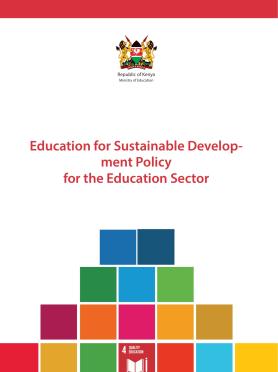2017 Education for Sustainable Development Policy for the Education Sector
2017 Education for Sustainable Development Policy for the Education Sector
Kenya is a nation of multi-cultural diversity founded on national values and principles that include sustainable development. The country is committed to integrating the principles and practices of sustainable development into all aspects of education and learning to promote knowledge, values and attitudes with a view to creating a more sustainable and just society for all. This has been achieved through mobilization of the country’s potential and resources to increase access to quality education. Efforts are being made to achieve economic growth without compromising the environmental and natural resource integrity of the country.
The Kenya Constitution 2010 prioritizes Sustainable Development as a National Goal. The Government of Kenya has therefore, an obligation to lead all citizens towards attaining this goal. The Government is committed to promoting ESD as a key factor in enabling sustainable development and quality education by implementing the Rio Conventions, UNESCO Global Action Programme (GAP) and the 2030 Agenda for Sustainable Development. The country has also ratified most of the international agreements, treaties, conventions and protocols including the Sustainable Development Goals (SDGs).
To achieve SDGs, the Government has developed a Green Economy Strategy and Implementation Plan (GESIP) to support development efforts towards addressing key challenges such as poverty, unemployment, inequality, environmental degradation, climate change and variability, infrastructure gaps and food security among others. Kenya’s Vision 2030 is the government’s principal document guiding socio-economic and political development. Vision 2030 and GESIP have identified ESD as an effective strategy for building capacities to undertake a transition to a green economy in Kenya.

